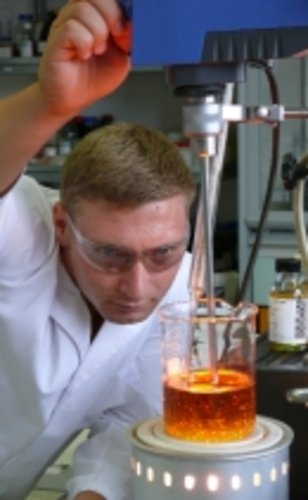Oil like honey

The Russian port of Ust-Luga on the Baltic Sea is a project of superlatives
Approximately 25 million tonnes of crude oil and heavy oil can be loaded from there and transported on by ship every year. The huge facility forms the end point of the Baltic pipeline system and was inaugurated two years ago. When loading crude oil, the Russian experts use a quality product from Central Germany from the outset: the heat transfer oil XV 15 by the company ADDINOL Lube Oil GmbH from Leuna, Saxony Anhalt. It ensures that the oil in the tanks remains fluid and suitable for pumping, even during the cold Russian winter.
Oil is a bit like honey: in cold conditions it loses its smooth fluidity and turns into a tough mass. It is no longer fit for transport in this state. To prevent this, a special heat transfer facility was built in the Russian port of Ust-Luga, which is located approximately 130 kilometres southwest of Saint Petersburg. "Approximately 1,350,000 litres of heat transfer oil from Leuna now circulate here. It keeps the crude oil in the tanks at the right temperature", explains Frank Merbitz. The chemist works on application technology for the company ADDINOL Lube Oil GmbH in Leuna. This is the department that sees itself as a link between research and development on the one hand and the application of the customers on the other hand. It was involved in the technical implementation of a major project in cooperation with the Russian subsidiary company.
"Heat transfer oil is usually used in continuous operation and must perform for many years without failure", says Frank Merbitz. Its boiling point must be as high as possible, since this is the only way of guaranteeing a safe method of heating it up in a closed system such as in a heat transfer facility. At the same time it must have a good viscosity so that it is also possible to heat it up under extreme conditions using the lowest possible energy supply. The requirements for the facility in Ust-Luga are particularly high: the Russian partners required a guaranteed operating time of five years as well as a very high temperature resistance. "The levelling rule with such products is extremely high internationally. It therefore is not taken for granted if you secure such a contract", says Merbitz. Ultimately, not only the demands on the quality of the product are high but the logistics, i.e. transport to the site of operation, also play a crucial role.
The heat transfer oil from Leuna was transported to Russia overland. Another mode of transport was simply not possible. Since the port in Ust-Luga was still under construction at the time, ships could not land there on a large scale. Transport by rail would have been too expensive because heat transfer oil would have to have been pumped out of the rail tank car in this case at a high cost. This meant that transport by lorry was the only remaining option. What at first sounds simple was actually a logistical challenge since the product had to be transported from Central Germany to the site of operation on the Russian Baltic coast in large quantities and in the shortest possible time."That was a feat for our logistics department", says Merbitz. After all, approximately 2,000 kilometres on some very rough roads had to be overcome during transportation.
Due to the enormous size of the delivery, several transport companies had to be commissioned. And because the conditions were so difficult, all-terrain trucks were used instead of the usual tank lorries.In the initial phase, ten vehicles fully loaded with containers left the company site and headed towards Russia. However, the first major disruption occurred at the border: the convoy was stopped by the authorities. The freight was meticulously examined and it took two full weeks before all customs formalities were completed. Shortly afterwards the next surprise occurred: the asphalt road simply ended a few kilometres before the end destination. The lorries were forced to travel the rest of the way on a sandy path full of potholes.
Eventually, though, they arrived safely at the final destination as well as further freightage after them. Fifty vehicles from Leuna arrived in Ust-Luga this way in just three months. Each of them had 22 containers, each with 1,000 litres of heat transfer oil. Since then, the oil from Leuna has operated reliably and without fault in Ust-Luga. "It is a high-quality product", says Frank Merbitz, "and its quality is regularly tested at the site." There have been no complaints so far. Merbitz, who has seen the project through from the beginning, is also relieved: "Large projects such as this, in which several foreign partners are involved, are not entirely predictable. That is another reason why we are glad that everything went well and our efforts and work have paid off. We are also quite proud of it."
